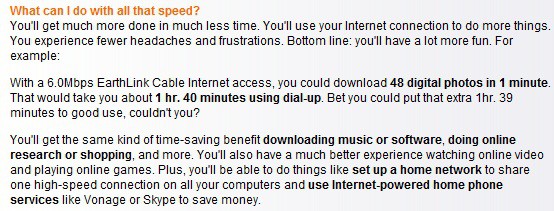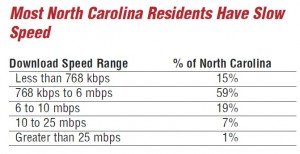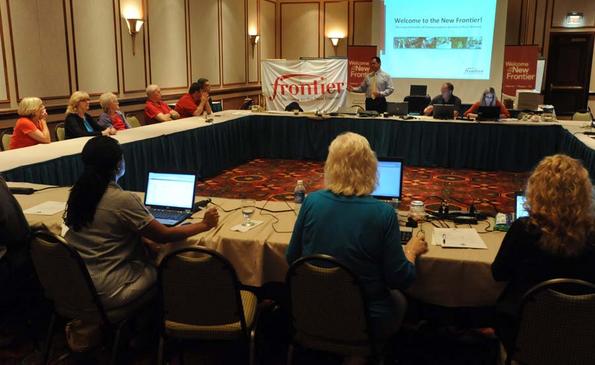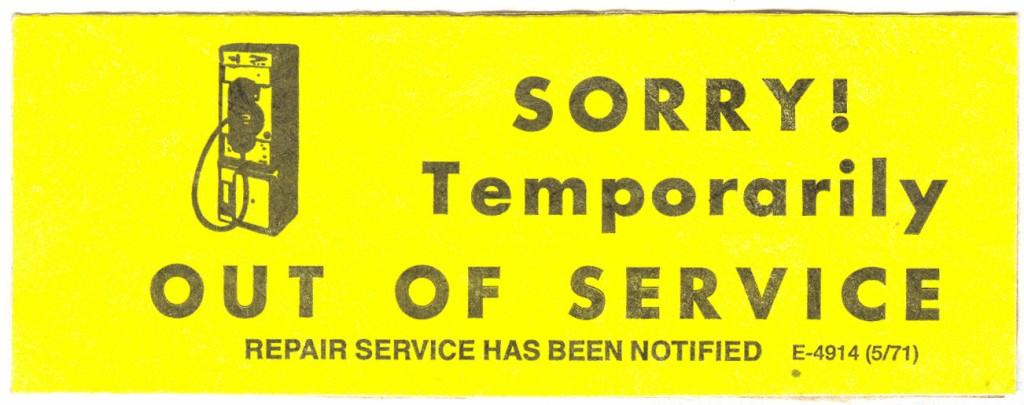 Earthlink, which depends on phone and cable companies to deliver its broadband service, has imposed a monthly usage limit of 250 gigabytes on its customers obtaining service from Comcast.
Earthlink, which depends on phone and cable companies to deliver its broadband service, has imposed a monthly usage limit of 250 gigabytes on its customers obtaining service from Comcast.
Customers began receiving postcards in May notifying them about the change in service terms which took effect July 1st. Earthlink blamed the usage limits solely on Comcast, noting they were dependent on other companies to provide the infrastructure necessary to reach customers:
Comcast and other cable providers provide portions of the network that EarthLink High Speed Cable service uses to deliver broadband Internet access. EarthLink provides the other portions of the network and services like Webmail and the myEarthLink Start Page®. EarthLink works with its business partners, like Comcast, to manage the network infrastructure. […]Because Comcast is EarthLink’s business partner in providing the EarthLink Powered by Comcast Service, EarthLink is working closely with Comcast in implementing this Usage Cap.

Internet providers routinely sell the benefits of their broadband accounts to better accomplish data-heavy activities like online video using their service, even though in some cases all of that "heavy use" is being used as an excuse to implement usage limits on customers.
In reality, Earthlink offers little more than a handful of its own services to customers. Most of its network connectivity, billing, and other services are handled by the providing cable or phone company. Customer support with many technical issues is handled by Earthlink’s own off-shore technical support staff.
Still, Earthlink had offered an alternative to those threatened with Internet Overcharging schemes by Time Warner Cable and Comcast because the company had not adopted those usage limits until Comcast insisted they follow suit. Presumably with this precedent in place, any other Overcharging schemes imposed by these providers would also impact their respective Earthlink customers.
For those violating the usage limits, enforcement won’t come from Earthlink. Instead, the provider warns, Comcast will be the entity that comes down on your head.
The vast majority – more than 99% – of customers will not be impacted by the monthly 250 GB Usage Cap. In the event that you exceed more than 250 GB, you may receive a telephone call from Comcast notifying you that you exceeded the 250 GB Usage Cap in the previous month. The customer service representative on this telephone call will (i) tell you how much data per month the account has used, (ii) help you identify the source of excessive use, (iii) explain ways to moderate and reduce your data usage, and (iv) explain the consequences of continuing overusage including termination of the EarthLink Powered By Comcast Service.
Based on Comcast’s past records, the vast majority of customers voluntarily reduce their data usage after this initial call. However, if after you receive this telephone call from Comcast, you continue to exceed the 250 GB Usage Cap during any month within the six month period after this first telephone call, your EarthLink Powered by Comcast Service may be terminated. For example, if your account exceeded the Usage Cap in the month of August and Comcast contacted you the first week of September informing you that your account exceeded the 250 GB Usage Cap in August, if your account exceeds the monthly Usage Cap in September, October, November, December, January or February, your EarthLink Powered By Comcast Service may be terminated. In the event that your EarthLink Powered by Comcast Service is terminated as a result of exceeding the 250 GB monthly Usage Cap, you will have to wait one year from the termination date to be able to subscribe to the EarthLink Powered by Comcast Service again.
[…]Comcast has found that most customers who exceed the Usage Cap during one month change their usage patterns or make other adjustments in their data usage. It is our expectation that only a small fraction of the tiny number of customers whose accounts exceeded the monthly Usage Cap for at least two months during a six month period will have their EarthLink Powered By Comcast Service terminated for one year.
For now, Earthlink customers will have to call the company (888-327-8454) to determine how much data they’ve used during the month as the Comcast data usage meter is apparently only for Comcast customers.


 Subscribe
Subscribe





